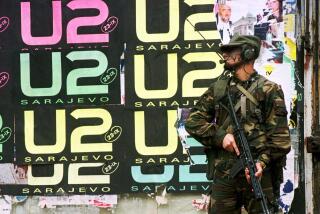Nation-Building on Blood-Soaked Soil : Bosnia faces barriers in the form of bitter memories
- Share via
Of all the horrors of the Bosnian war-- some still hidden, none forgotten--the world remembers those in Sarajevo. The capital was a big, accessible canvas. During the early months of the conflict, correspondents could fly in and record the shelling right outside their windows at the Holiday Inn. Later on, Serbian gunners closed the airport and it took a hairy drive over the mountains to reach Sarajevo. By this point the Holiday Inn was more window than wall. Reporters sent back words and film of the obliteration of the city and unforgivable attacks on civilians. Both Serbs and Muslims took part, with the latter usually getting the worst of it. Serbian snipers picked off pedestrians. Muslim artillery pounded their enemy’s trench lines on the high ground.
This is Sarajevo, once a beautiful backwater capital of the Ottoman Empire, then of the Austro-Hun- garian Empire, and lastly of Bosnia-Herzegovina, the most ethnically mixed republic of the former Yugoslavia. The 1984 Winter Olympics were held in the mountains that crown the city. Seventy years earlier, a Serbian nationalist assassinated Austrian Archduke Francis Ferdinand at Sarajevo, setting in motion the treaty commitments that led to World War I.
A VIOLENCE FACE: This violent side is the Sarajevo we now know. The Washington-engineered Dayton Treaty, which ended four years of war last month, calls for Muslim-Croat and Serbian political entities to form a new national federation. And Sarajevo, a predominantly Muslim city, will be the national capital. There’s the rub. Too much blood. The prospect of a Bosnian citizen in a Bosnian country made up of Muslims, Serbs and Croats will take more time than the diplomats in Ohio allowed.
Last week, Times correspondent Tracy Wilkinson came upon Nikola Ljesic at the Vlakovo Cemetery in Ilidza, a Serbian suburb of Sarajevo. The old man was digging up the body of his son, killed in the fighting. “Since Dayton, we have to take away our dead. They cannot rest in peace,” he said. “We are doing this because we do not want to leave the graves to Muslim fanatics. They would dig up the bones and burn them.”
This is the depth of the divisions in Sarajevo and Bosnia. The Serbs are digging up their fallen sons, and the Muslims are demanding, righteously but with foreboding, that the Western powers make the Serbs uncover a more appalling horror--the missing Muslims almost certainly massacred and buried in mass graves in Serbian-controlled areas.
SEARCH FOR MURDERERS: Under the terms of the peace treaty, the Americans, French and British NATO peacekeeping forces are obligated to turn over to a United Nations war crimes tribunal any indicted persons who fall into their hands. But there is no sign that the Western soldiers are going out looking for suspects. This newspaper has agreed that pursuit of indicted individuals goes beyond peacekeeping, but also notes that mass killers will never have another comfortable night’s sleep. Not in the Balkans.
More encouraging was the visit Sunday to Serbian-controlled territory by John Shattuck, assistant U.S. secretary of state for human rights. Shattuck was investigating reports of mass graves of Muslims driven from Srebrenica and other eastern towns during the fighting. The responsibility for these crimes reaches high into the Serbian command structure. Two top Bosnian Serbs, Radovan Karadzic and Ratko Mladic, have been indicted by the tribunal. Times reporters have discovered that top intelligence agencies in Washington are now investigating whether a trail of complicity leads all the way up to Serbian President Slobodan Milosevic. Justice and American national interests demand that they pursue any lead.
But the Muslim and Serbian blood in the soil of Bosnia will not be erased by the West. This will take a long time.
More to Read
Sign up for Essential California
The most important California stories and recommendations in your inbox every morning.
You may occasionally receive promotional content from the Los Angeles Times.










